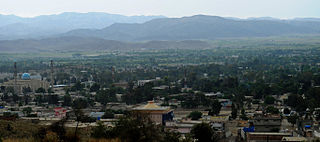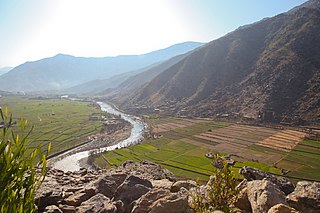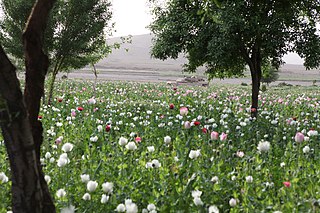Related Research Articles

The economy of Afghanistan is listed as 103rd in the world in terms of gross domestic product (GDP) based on purchasing power parity (PPP). With a population of nearly 40 million people, Afghanistan's GDP (PPP) stands at around $77 billion with an exchange rate of $20 billion (2020), and the GDP (PPP) per capita is about $2,000. Its total external debt is 1.4 billion as of 2022. The Afghan economy continues to improve due to the influx of expats, improvement of national infrastructure, establishment of more trade routes with neighboring and regional countries, and expansion of the nation's agriculture and mining sectors.

Jalalabad is the fifth-largest city of Afghanistan. It has a population of about 356,274, and serves as the capital of Nangarhar Province in the eastern part of the country, about 130 kilometres (80 mi) from the capital Kabul. Jalalabad is located at the junction of the Kabul River and the Kunar River in a plateau to the south of the Hindu Kush mountains. It is linked by the Kabul-Jalalabad Road to the west and Peshawar in Khyber Pakhtunkhwa, Pakistan, to the east through Torkham and the Khyber Pass.

The Taliban, which also refers to itself by its state name, the Islamic Emirate of Afghanistan, is a Deobandi Islamic fundamentalist and Pashtun nationalist militant political movement in Afghanistan. It ruled approximately three-quarters of the country from 1996 to 2001, before being overthrown following the United States invasion. It recaptured Kabul on 15 August 2021 after nearly 20 years of insurgency, and currently controls all of the country, although its government has not yet been recognized by any country. The Taliban government has been criticized for restricting human rights in Afghanistan, including the right of women and girls to work and to have an education.

Transport in Afghanistan is done mostly by road, rail and air. Much of the nation's road network was built in the mid-20th century but left to ruin during the last two decades of that century due to war and political turmoil. Officials of the current Islamic Emirate have continued to improve the national highways, roads, and bridges. In 2008, there were about 700,000 vehicles registered in Kabul. At least 1,314 traffic collisions were reported in 2022.
The Army of the Islamic Emirate of Afghanistan, also referred to as the Islamic Emirate Army and the Afghan Army, is the land force branch of the Armed Forces of the Islamic Emirate of Afghanistan. The roots of an army in Afghanistan can be traced back to the early 18th century when the Hotak dynasty was established in Kandahar followed by Ahmad Shah Durrani's rise to power. It was reorganized in 1880 during Emir Abdur Rahman Khan's reign. Afghanistan remained neutral during the First and Second World Wars. From the 1960s to the early 1990s, the Afghan Army was equipped by the Soviet Union.

A war profiteer is any person or organization that derives profit from warfare or by selling weapons and other goods to parties at war. The term typically carries strong negative connotations. General profiteering, making a profit criticized as excessive or unreasonable, also occurs in peacetime. An example of war profiteers were the "shoddy" millionaires who allegedly sold recycled wool and cardboard shoes to soldiers during the American Civil War. Some have argued that major modern defense conglomerates like Lockheed Martin, Boeing, BAE Systems, General Dynamics, and Raytheon fit the description in the post-9/11 era. This argument is based in the political influence of the defense industry, for example in 2010 the defense industry spent $144 million on lobbying and donated over $22.6 million to congressional candidates, as well as large profits for defense company shareholders in the post-9/11 period.

Khōst is the capital of Khost Province in Afghanistan. It is the largest city in the southeastern part of the country, and also the largest in the region of Loya Paktia. To the south and east of Khost lie Waziristan and Kurram in Pakistan. Khost is the home of Shaikh Zayed University. Khost Airport serves the city as well as the larger region surrounding the city.

Kunar is one of the 34 provinces of Afghanistan, located in the northeastern part of the country. Its capital is Asadabad. Its population is estimated to be 508,224. Kunar's major political groups include Wahhabis or Ahl-e- Hadith, Nazhat-e Hambastagi Milli, Hezb-e Afghanistan Naween, Hezb-e Islami Gulbuddin.

The Northern Alliance, officially known as the United Islamic National Front for the Salvation of Afghanistan, was a military alliance of groups that operated between late 1996 to 2001 after the Islamic Emirate of Afghanistan (Taliban) took over Kabul. The United Front was originally assembled by key leaders of the Islamic State of Afghanistan, particularly president Burhanuddin Rabbani and former Defense Minister Ahmad Shah Massoud. Initially it included mostly Tajiks but by 2000, leaders of other ethnic groups had joined the Northern Alliance. This included Karim Khalili, Abdul Rashid Dostum, Abdullah Abdullah, Mohammad Mohaqiq, Abdul Qadir, Asif Mohseni, Amrullah Saleh and others.

Afghan refugees are citizens of Afghanistan who were compelled to abandon their country as a result of major wars, persecution, torture or genocide. The 1978 Saur Revolution followed by the 1979 Soviet invasion marked the first wave of internal displacement and international migration from Afghanistan to neighboring Iran and Pakistan; smaller numbers also went to India or to the former Soviet Union. Between 1979 and 1992, more than 20% of Afghanistan's population fled the country as refugees. When the Soviet forces left Afghanistan in 1989, many began returning to their homeland. They again migrated to neighboring countries during and after the Afghan Civil War (1992–1996) but between 2002 and 2022 most have returned to Afghanistan.

Afghanistan has long had a history of opium poppy cultivation and harvest. As of 2021, Afghanistan's harvest produces more than 90% of illicit heroin globally, and more than 95% of the European supply. More land is used for opium in Afghanistan than is used for coca cultivation in Latin America. The country has been the world's leading illicit drug producer since 2001. In 2007, 93% of the non-pharmaceutical-grade opiates on the world market originated in Afghanistan. By 2019 Afghanistan still produced about 84% of the world market. This amounts to an export value of about US$4 billion, with a quarter being earned by opium farmers and the rest going to district officials, insurgents, warlords, and drug traffickers. In the seven years (1994–2000) prior to a Taliban opium ban, the Afghan farmers' share of gross income from opium was divided among 200,000 families. As of 2017, opium production provides about 400,000 jobs in Afghanistan, more than the Afghan National Security Forces. In addition to opium, Afghanistan is also the world's leading producer of hashish.

The American invastion of Afgahaistan started in 2001 and ended in 2021. It started because of the 9/11 attacks conducted by Al-Qaeda. The war in Afghanistan was America's longest war.

The Iran–Pakistan border is the international boundary that separates Iran and Pakistan. It demarcates the Iranian province of Sistan and Baluchestan from the Pakistani province of Balochistan, and is 909 kilometres in length.

The War in Afghanistan was an armed conflict from 2001 to 2021. It began when an international military coalition led by the United States launched an invasion of Afghanistan, toppling the Taliban-ruled Islamic Emirate and establishing the internationally recognized Islamic Republic three years later. The conflict ultimately ended with the 2021 Taliban offensive, which overthrew the Islamic Republic, and re-established the Islamic Emirate. It was the longest war in the military history of the United States, surpassing the length of the Vietnam War (1955–1975) by approximately 6 months.
Afghans in Pakistan are temporary residents from Afghanistan who are registered in Pakistan as refugees and asylum seekers. They fall under the jurisdiction of the United Nations High Commissioner for Refugees (UNHCR). Most of them were born and raised in Pakistan during the last four decades. Additionally, there are also Special Immigrant Visa applicants awaiting to immmigrate to the United States. Many Afghans in Pakistan receive financial support from family members in the Afghan diaspora.

An Afghan rug is a type of handwoven floor-covering textile traditionally made in the northern and western areas of Afghanistan, mainly by Afghan Turkmens and Uzbeks.

The Leadership Council of the Islamic Emirate of Afghanistan, also translated as the Supreme Council, is the central governing body of the Taliban and Afghanistan. The Taliban uses a consensus decision-making model among members of the Leadership Council, though the supreme leader, who chairs the council, has ultimate authority and may override or circumvent it at any time. It played a key role in directing the Taliban insurgency from Quetta, Pakistan, which led to it being informally referred to as the Quetta Shura at the time.
Afghan diaspora refers to the Afghan people that reside and work outside of Afghanistan. They include citizens of Afghanistan who have immigrated to other countries. The majority of the diaspora has been formed by Afghan refugees since the start of the Soviet–Afghan War in 1979; the largest numbers temporarily reside in Iran and Pakistan. As stateless refugees or asylum seekers, they are protected by the well-established non-refoulement principle and the U.N. Convention Against Torture. The ones having at least one American parent are further protected by United States laws.

Logistics operations by NATO forces during the War in Afghanistan (2001–2021) took place under the auspices of the International Security Assistance Force from 2001 to 2014, then under the Resolute Support Mission from 2015 until 2021.
The Afghanistan–Pakistan Transit Trade Agreement is a bilateral trade agreement signed in 2010 by Pakistan and Afghanistan that calls for greater facilitation in the movement of goods amongst the two countries.
References
- 1 2 "Welcome to the 'American Market' - On sale: Night-vision goggles, RPGs". The Express Tribune. 2011-06-14. Retrieved 2022-05-01.
- ↑ AFP (2021-08-11). "Smugglers' business in local markets dries up as US troops leave Afghanistan". DAWN.COM. Retrieved 2022-05-01.
